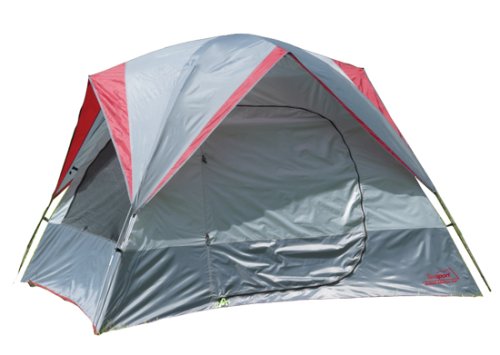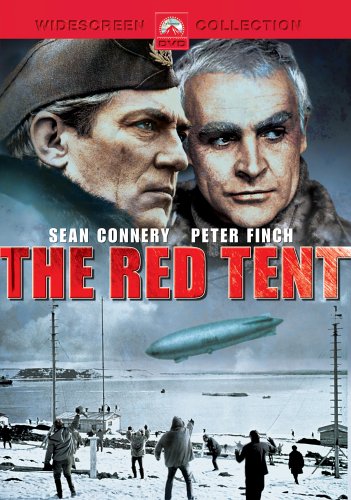Texsport Kendall Square Dome Tent
 Large enough to accommodate five, this 10-foot-square domed tent protects campers during three seasons and features a half-length four-peak rainfly. A D-style door with zippered storm flap, windows, and large roof panels let in lots of light and air and are made of fine mesh to screen out insects as small as no-see-ums. Inside there's a mesh storage pocket. Measuring 78 inches high at its tallest point, the tent sets up on a two-pole pin-and-ring frame system with shock-corded fiberglass poles. Durable steel clips secure tent to frame. Polyurethane coats heavy-duty, flame-retardant taffeta walls and rainfly. The floor is rip-stop polyethylene. Stakes and a carry/storage bag come with the tent. Setup instructions are included.
Large enough to accommodate five, this 10-foot-square domed tent protects campers during three seasons and features a half-length four-peak rainfly. A D-style door with zippered storm flap, windows, and large roof panels let in lots of light and air and are made of fine mesh to screen out insects as small as no-see-ums. Inside there's a mesh storage pocket. Measuring 78 inches high at its tallest point, the tent sets up on a two-pole pin-and-ring frame system with shock-corded fiberglass poles. Durable steel clips secure tent to frame. Polyurethane coats heavy-duty, flame-retardant taffeta walls and rainfly. The floor is rip-stop polyethylene. Stakes and a carry/storage bag come with the tent. Setup instructions are included. Amazon.com Tent Guide
Selecting a Tent
Fortunately, there are all kinds of tents for weekend car campers, Everest expeditions, and everything in-between. Here are a few things to keep in mind:
Expect the Worst
In general, it's wise to choose a tent that's designed to withstand the worst possible conditions you think you'll face. For instance, if you're a summer car camper in a region where weather is predictable, an inexpensive family or all purpose tent will likely do the trick--especially if a vehicle is nearby and you can make a mad dash for safety when bad weather swoops in! If you're a backpacker, alpine climber or bike explorer, or if you like to car camp in all seasons, you'll want to take something designed to handle more adversity.
Three- and Four-Season Tents
For summer, early fall and late spring outings, choose a three-season tent. At minimum, a quality three season tent will have lightweight aluminum poles, a reinforced floor, durable stitching, and a quality rain-fly. Some three-season tents offer more open-air netting and are more specifically designed for summer backpacking and other activities. Many premium tents will feature pre-sealed, taped seams and a silicone-impregnated rain-fly for enhanced waterproofness.
For winter camping or alpine travel, go with a four season model. Because they typically feature more durable fabric coatings, as well as more poles, four-season tents are designed to handle heavy snowfall and high winds without collapsing. Of course, four-season tents exact a weight penalty of about 10 to 20 percent in trade for their strength and durability. They also tend to be more expensive.
Domes and Tunnels
Tents are broadly categorized into two types, freestanding, which can stand up on their own, and those that must be staked down in order to stand upright. Freestanding tents often incorporate a dome-shaped design, and most four-season tents are constructed this way because a dome leaves no flat spots on the outer surface where snow can collect. Domes are also inherently stronger than any other design. Meanwhile, many three-season models employ a modified dome configuration called a tunnel. These are still freestanding, but they require fewer poles than a dome, use less fabric, and typically have a rectangular floor-plan that offers less storage space than a dome configuration. Many one and two-person tents are not freestanding, but they make up for it by being more lightweight. Because they use fewer poles, they can also be quicker to set up than a dome.
Size Matters
Ask yourself how many people you'd like to fit in your fabric hotel now and in the future. For soloists and minimalists, check out one-person tents. If you're a mega-minimalist, or if you have your eye on doing some big wall climbs, a waterproof-breathable bivy sack is the ticket. Some bivy sacks feature poles and stake points to give you a little more breathing room. Also, if you don't need bug protection and you want to save weight, check out open-air shelters.
Families who plan on car camping in good weather can choose from a wide range of jumbo-sized tents that will accommodate all your little ones with room to spare. A wide range of capacities is also available for three- and four-season backpacking and expedition tents. Remember, though, the bigger the tent you buy, the heavier it will be, although it's easy to break up the tent components among several people in your group. It's also helpful to compare the volume and floor-space measurements of models you're considering.
Customer Review: Beware! Old and Used Tent from Amazon!
To be honest, I was excited that I was going to get my first tent and I plan to use it really soon. However, after I received it today, I was surprised to find out that the condition of the tent was in. It was not new at all and as matter of fact, it was very used. The carrying bag has dirt/grass over it. The tent was folded nicely in a box to fool me to think that it was new but once I opened up the tent, I notice that the tent has probably been used many times. I guess it was a customer-returned item before. I am a regular customer of Amazon. It's not my first time that I received an used product from Amazon but this time the condition of this tent was just not acceptable (I would probably find a newer tent in a thrifty store). Needless to say, I am returning this but the shipping charge will be costly and straight coming out of my pocket. What a disappointing experience.
Inspiration for a better future lies in a secret experience from your past which will energize your present and clearly define your future.
You've been busy lately. You've sought for a new direction, because for the first time in your life you really want the years ahead to count. My hope for you is, as you read of my experience, you will be inspired to take a similar path and make your future years the most meaning-filled of your life.
In keeping with the biblical direction to "Ask and ye shall receive" I have recently given time to finding real meaning in my life, eventhough I should have completed this task years ago.
I've made an amazing discovery.
Your life, and mine, is filled with a series of what I have called Refining Moments. In the middle of these is one KRM or Key Refining Moment. When discovered this KRM brings a flood of understanding of the meaning for your life and enables you to release a special talent to be a blessing to others.
In my morning prayer time in the forest at the back of our home I had been asking the Lord, for some months, to reveal the meaning and purpose for my life. Once I was prepared to wait forever for an answer,it came. In a most unexpected way. Some have said that you should be careful what you pray because sooner or later you will get what you pray for. I did.
I was reminded of an experience I had just after my fourth birthday.
Filled with expectation my mother was taking me to the State Fair. A visit to the Animal Nursery was promised and once again I'm back there, getting off the tram, with a beaming smile, being led by the hand to the ticket office where my Mother purchases our tickets.
I can see the bulls in the main arena and the colored tents in sideshow alley. I hear the drums summoning patrons to new and exciting experiences inside the tents.
And now I see a group of kids. Some in wheelchairs. Some standing. But all with bodies twisting and twitching in ways I had never seen before. Noticing my rising alarm, my Mother tells me they are the special kids from the Spastic Center.
As she explains that they will always be that way I begin to sob. Buckets of tears cascade down my little pink cheeks as I think of their suffering. I fall to the ground sobbing even harder unable to control myself.
I feel a pain deep on the inside and I want to get away from this place. I plead with my Mother to take me home. It seems to take a long time but eventually she walks me back to the tram terminus.
As we begin the journey home one thought floods my mind.
I want to help make them better.
As I return, across 53 years of life experience, from my time of reflection on the past, I realize that my central desire is still to help make them better.
I havn't done it yet but I want to. There is a fire in my desire.
I have been a bank teller, an economist, a teacher, and a youth worker but still I havn't gotten started. I'm sad I've yet to start. I guess that's a common experience for a babyboomer. However I am glad I discovered why I'm here on this planet.
In this Key Refining Moment I have understood my reason for being and the only action that will add real meaning to my life.
I have been inspired to fulfill my calling to "help make them better".
You can have your own Key Refining Moment. In earnest prayer ask and you will receive. Once you've received make sure to follow through and complete your special calling.
You will get inspiration for a lifestyle improvement .Use your secret experience from your past and it will energize your present and clearly define your future with wave upon wave of meaning.
You will finally have an answer to the age-old question, "What is the meaning of life?"
Kenneth Little is a success coach and the publisher of a re-released classic, in a revealing ebook, that will show you how to get the best of health and wealth out of all your future years. True success will be yours no matter what your age.
Amazing "How I Became Young at Sixty" brings renewed strength to your body, hope to your mind and increased prosperity to your lifestyle.==> http://www.Young-at-Sixty.com

